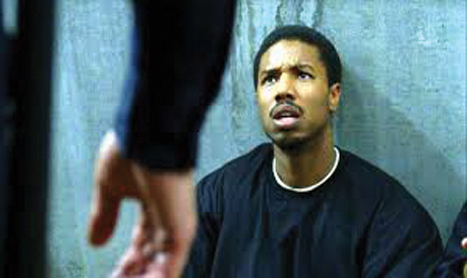
A Screening of ‘Fruitvale Station’
By R. Preston Clark
Staff Writer
Young lives are being lost. Young black men are being vilified simply for being themselves. But why? Why is America afraid of young black men?
That was the question posed on Saturday at the Bayview Baptist Church MLK Center during a panel discussion following a screening of ‘Fruitvale Station’, a critically-acclaimed feature film depicting the final day in the life of 22-year-old Oscar Grant, who was shot and killed on New Year’s Day 2009 in Oakland, CA.
The symposium was organized by the San Diego African-American Museum of Fine Arts (SDAAMFA), which is currently featuring artwork commemorating the 50th anniversary of the 1964 Civil Rights Act in MLK Center, and moderated by Cecil Steppe, who previously worked for the Department of Probation for 26 years.
With representatives from different factions of the community present, including San Diego Chief Probation Officer Mack Jenkins, Thomas Jefferson Law Professor Marjorie Cohn, NAACP Youth Chapter President Isaiah Price and Bayview Baptist Church Senior Pastor Terry Brooks, the panel became a call to action.
“From pain comes richness of movement,” Steppe said.
The screening left an eerie silence over the room as the audience was left to soak in the truth of a tragedy. Even with many already knowing the ending of the film, watching it unfold while getting to know Oscar Grant, a young man trying to right his past wrongs by providing for his daughter, humanized him and his actions, and further proved the unnecessary actions of those who took his life.
Among those on the panel was Cephus Johnson, affectionately known as Uncle Bobby by his family, which included his nephew, Oscar. Having a representative from Grant’s family among those in attendance, served as human representation that young men like Grant, Jordan Davis, Trayvon Martin, Ramarley Graham, Sean Bell and the countless others who have been gunned down while unarmed are being taken from families who are left to grieve and ask why.
“America does not love our black youth,” said Johnson during his opening remarks. “If we don’t talk to our children about our horrors, they won’t even know.”
Impassioned throughout his remarks, it was plain to see how difficult it is for Johnson to speak on this subject, though he continues to do so all over the country in his nephew’s name.
“We need to instill greatness in our young men,” Johnson said. “I’m tired of seeing these teary-eyed mothers. I get real emotional about this. We are in a state of emergency.”
Price spoke candidly about his relationship with his father, Eddie Price, and how if it was not for that relationship, he would not have the sense of history he possesses since school does not provide him with the necessary pride or information.
“Everybody wants to be black but don’t know the struggle,” Isaiah said. “I haven’t had a black teacher since the 8th grade. I learn more about black history from my dad and Google.”
That sense of disconnection from the past has put black youth in a precarious position that Johnson feels is his generation’s fault.
“We owe our youth an apology,” Johnson said. “We dropped the ball.”
Chairman of the SDAAMFA Board, Gaidi Finnie, got what he wanted. An evening combining social action, the arts and the museum through much needed conversation about the state of black America.
“Fruitvale Station, as you can see, brought out the old and the young to see this important, artistic film,” Finnie said. “So we thought it would really enhance [the museum] and bring people here.”


